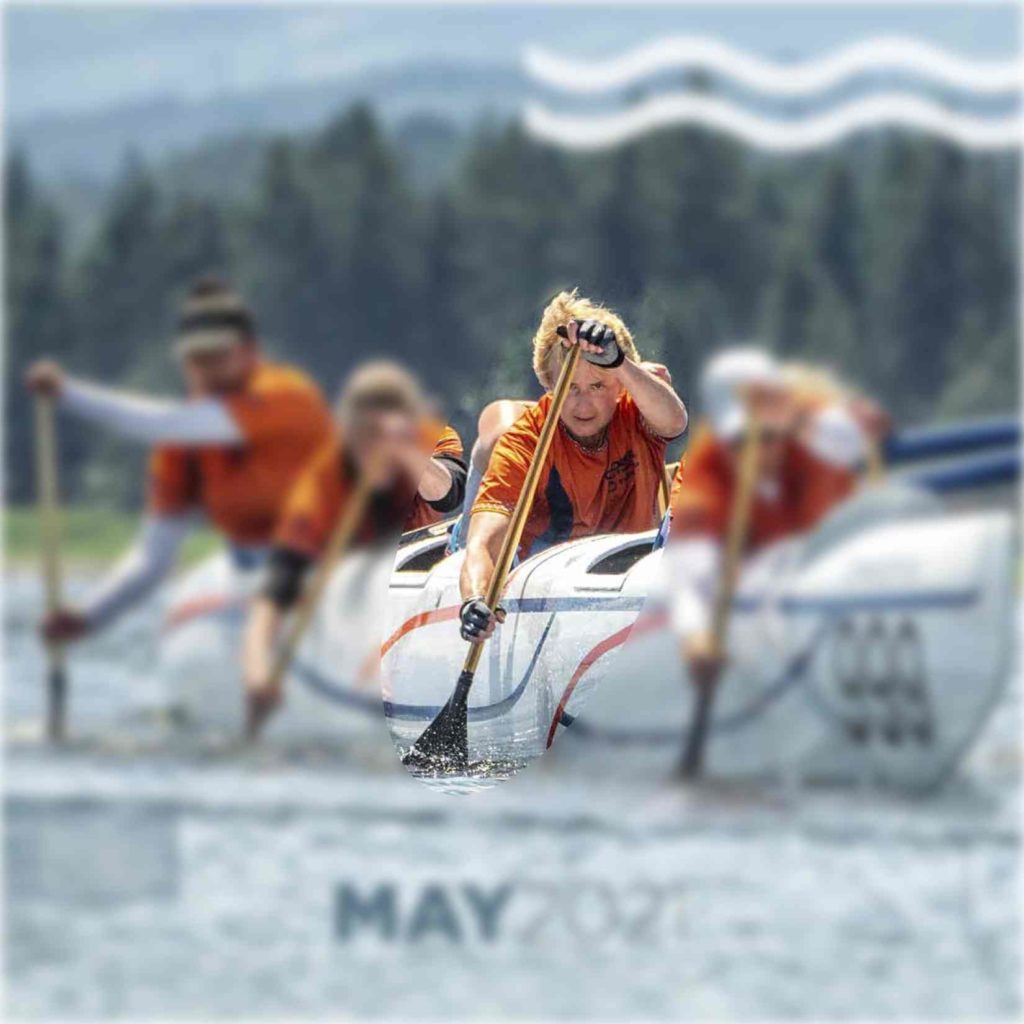Dragon Boat, Outrigger, trail running, surf ski, marathon canoe, cyclist, former varsity rower, General Counsel with the Province of B.C., Chair of FGPC’s board
Years of paddling: 14 years
Teams: Competitive Outrigger program, VIP dragon boat
“It’s funny, because I realized there were at times periods of two to three days where I actually didn’t leave the house.”
Tarah Hastings is a committed athlete who was preparing for the grueling Maui to Molokai solo outrigger canoe race when COVID-19 struck. The M2M race, from the island of Molokai to the island of Oahu, is known as paddling’s most challenging race in some of the world’s toughest waters.
Q: What inspires you most about paddling?
A: For me, it’s a combination of the fitness, being out in nature and also the social aspects. Like just getting to know people through doing things together as a team and traveling together.
You get to know people when you’re on a team but you get to know them even better when you travel as a team and go to different destinations. You know, sharing accommodations and sharing meals. I’ve made lots of friends through paddling. And it’s a way to meet people who have similar interests.
Q: How would you describe how the paddling community has affected your life?
A: In terms of the community part of it, it’s about making friends, really. The work I do is pretty solitary. Of course, we talk amongst the people in my office, but our office is very small and I spend most of my day with my head in documents.
So after work when I get to go paddling. It’s also the time where I get to interact with people more and hang out with people that you joke around with and things like that right.
Q: How active were you before COVID-19 hit?
A: I was paddling a lot right before COVID because I was training for the Maui to Molokai solo race. That race was supposed to happen in April and so I was training probably four to five days a week on the water. We were doing the gym once or twice a week and I cycled to work and trail running, but at that point in time I was really focused on getting quite a bit of mileage in on the water because that race is 42 kilometers. Back in February, I was doing a 10-to-12k paddle after work and then on the weekends I was doing up to a three-hour paddle.
Q: How did you initially cope with the crisis and what are you doing now?
A: It was the end of February or the very beginning of March when they decided to cancel that race. So it sort of let the wind out of my sails a little bit.
I switched my activities, a bit towards trail running, and I was also doing a bit more cycling and doing some workouts at home.
It was funny, because I realized there were at times periods of two to three days where I actually didn’t leave the house because I was working at home and I was working out in the basement. And, you know, there were times where it occurred to me that I hadn’t left the house in three days, so maybe I’d better go for a bike ride.
Q: Have you learned anything positive about yourself or your community as a result of the crisis?
A: I’ve learned that people are really missing the connection with other people in the paddling community, especially the team connection. Having said that, we’re still able to connect by going out in small groups in our OC1, but recently I’ve noticed a lot of people saying they really miss you know the OC6 paddling and they miss the team environment. That has opened up a little and people seem to be really happy about that.
Q: When it comes to paddling, is there a person, event or team that has a special memory for you?
A: One of my favorite team races was with the comp outrigger program and we did a race in 2018 called the Napali Challenge in Hawaii. You got to see that beautiful North Coast area that normally is only accessible by a helicopter or boat. We actually got to race in those waters, and although it’s a change race, it’s different from a lot of change races because you’re in a mixed team with six men and six women. Basically the changes happen every half hour, so you actually have a substantial break where you’re on the power boat and taking in that amazing scenery a little. Normally in a race you don’t get an opportunity to do that. And we came third overall as a team and kind of surprised ourselves with how well we did. Then there was a big meal with everyone, like they do in Hawaii, and it was just fun to be immersed in that little bit of Hawaiian culture in that environment.
It was just a really beautiful, very positive experience.
Q: Is there a coach or mentor you’d like to recognize, and why?
A: Laci Bujdos (FGPC’s head coach for competitive and intermediate outrigger) is one of the better coaches I’ve had so far. His knowledge of surfing has been really helpful for me because surfing is really my favorite part of the actual act of paddling.
I love the waves and surfing the most out of anything. Laci has extensive knowledge of that and I found his coaching really good for my skills.
Q: When this crisis passes, in terms of paddling, what are you looking forward to the most when normalcy returns?
A: I’m looking forward to being able to travel to some races again. I’m hoping to be able to travel to Samoa for the World Championships next year. That’s supposed to be next August, so we’ll see if it happens.

